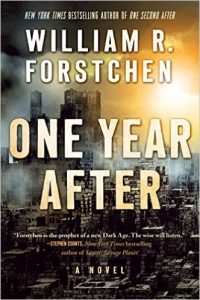 This is just not a very good book. It’s not a dreadful book. Just not very good. True, it’s better than most modern apocalyptic fiction, but that’s a low bar. And true, it has to compete with Fortschen’s previous book, “One Second After,” which was fantastic. But nonetheless, it’s not a very good book.
This is just not a very good book. It’s not a dreadful book. Just not very good. True, it’s better than most modern apocalyptic fiction, but that’s a low bar. And true, it has to compete with Fortschen’s previous book, “One Second After,” which was fantastic. But nonetheless, it’s not a very good book.
It is, however, a very realistic book. That is, were there to be an apocalypse of the EMP type, this book is a plausible interpretation of the longer-term aftermath and reconstruction. Fortschen understands what many apocalypse writers do not—that a vacuum in social order is abhorrent and will for certain be filled by something, because people will give up nearly anything to avoid anarchy; and that the new order is not likely to be filled by the second coming of George Washington and the Founding Fathers. Too much apocalyptic fiction (e.g., Rawles) believes that a decentralized, spontaneous, virtuous society would spring from the ashes, if we merely prioritize our guns, our Bibles, and our Madison. Not that there’s anything wrong with any of those three, or prioritizing them. But it makes the mistake of believing ingredients lead to results. It’s just like those 1950s experiments with running electricity through a cocktail of chemicals duplicating the atmosphere early Earth to see if life results. It doesn’t.
“One Year After” is, fortunately, not realistic in the other sense that so much apocalypse fiction is—as a how-to guide. It does not describe how, why, and from what online store Joe Blow purchased his phased plasma rifle in the 40-watt range, how he cared for it, and how well it shot enemies, under the guise of plot. This certainly helps it be more literature than cookbook, but it doesn’t rescue the book.
So the book is realistic. The interactions among the townspeople are realistic; the interactions with their neighbors are realistic; and the interactions with the nascent federal government are generally realistic. But there is so damn much talking in this book. Talk, talk, talk. And much of it is exposition talk. Well-written exposition, to be sure, but still duller than dirt. I agree with all the philosophy of the talkers, but the story doesn’t move far, and does not have any clean ending, presumably because Fortschen plans a sequel. That’s his prerogative, but it makes the book feel basically pointless.
